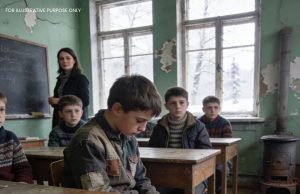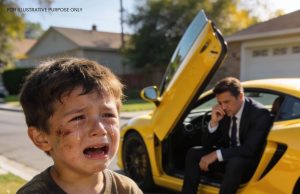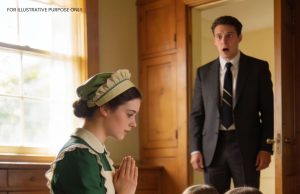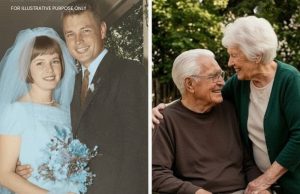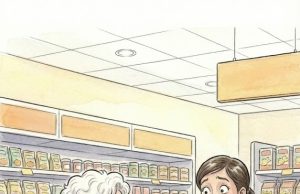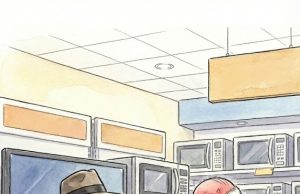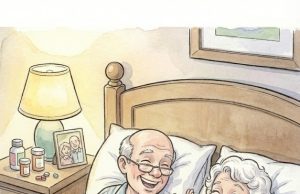
When the fire trucks screamed down Maplewood Lane that night, I was already awake. Insomnia is a curse of age, but sometimes it lets you see things others miss. Through the lens of my new 4K bird-watching camera—mounted to face the backyard feeders—I saw the first flickers of flame lick across the side of the Johnsons’ house. It was past midnight. The sky glowed orange, and within minutes, neighbors poured into the street in pajamas and slippers, their faces painted by the flames.
People said it was tragic. “Such a young couple,” they whispered. “Just starting out.”
I’d always thought there was something performative about Tyler and Madison Johnson. He was too charming, too polished for a man who claimed to manage “property investments,” and she smiled with the brittle tension of someone rehearsing empathy. They’d moved in six months ago, driving a brand-new black Tahoe and installing a hot tub before the boxes were even unpacked.
By morning, the Johnsons were being comforted in blankets by the fire chief. Their house was a smoldering skeleton. The fire department ruled it “suspicious but undetermined.” The Johnsons sobbed on local TV, talking about losing “everything.” Within days, a GoFundMe page popped up, and money poured in—ten thousand, then twenty, then thirty. The town rallied around them.
But I had questions. Because I had seen something that didn’t fit.
At 11:42 p.m.—before the flames—Tyler had walked from the side door to the shed, carrying a red gas can. He wasn’t running; he was calm, almost methodical. Then he’d gone out of view for five minutes. When he returned, the can was empty. Two minutes later, the first flame appeared near the same spot.
I didn’t say anything. Not yet. People like Tyler are careful; they talk to make you doubt your own memory. And besides, I had proof—the camera had recorded everything in perfect night vision.
Three days later, an insurance investigator knocked on my door. Slim man, khaki jacket, clipboard. The Johnsons were right behind him, their faces arranged into polite curiosity. “Mrs. Grant,” the investigator said, “we’re checking with neighbors about any observations the night of the fire.”
Tyler smirked. “Don’t bother, Eleanor,” he said smoothly. “She’s old and was probably asleep.”
I smiled back. “It’s true my eyes are poor,” I replied, my voice steady. “But my new 4K bird-watching camera has perfect night vision.”
And just like that—the smirk vanished.

The silence that followed my words could have cut glass. The investigator, a man named Richard Hale, lifted an eyebrow, pen poised above his clipboard.
“You have video footage, ma’am?”
“Yes,” I said simply, turning toward the hallway. “It records continuously. You’re welcome to see it.”
Tyler started to laugh—a quick, nervous sound. “Come on, Eleanor, you must be mistaken. You probably caught a raccoon or something.”
“Maybe,” I replied. “Let’s find out.”
Inside my small den, the three of them stood behind me as I navigated the camera’s playback. My house smelled faintly of chamomile tea and dust, the kind of smell that makes men like Tyler underestimate you. I found the file and pressed play. The infrared feed filled the monitor: the Johnsons’ backyard, grainy but clear. The timestamp: 11:42 p.m.
There he was—Tyler—carrying the red gas can toward the shed. Madison gasped, covering her mouth. He turned sharply toward her, eyes blazing.
“Don’t,” he hissed. “Don’t say a word.”
Richard Hale’s face was unreadable, but his pen began to move. When the flames appeared on screen, there was no mistaking the pattern of ignition—starting in three distinct spots. Arson.
“I’d like a copy of this footage,” Hale said quietly.
“Of course,” I replied, slipping a flash drive into the port. “I back up everything.”
The Johnsons left without another word. Tyler didn’t look back, but his jaw was clenched so tight I could almost hear the grind of teeth. Madison’s eyes, though—hers were wide, trembling, not defiant but scared.
The next few days were tense. The neighborhood buzzed with gossip; police cars visited their rental house twice. Then, suddenly, Madison came to see me. She was pale, makeup gone, a bruise darkening under one eye.
“I didn’t know he’d actually do it,” she whispered. “He said it was just for the insurance—just a small fire. He told me to cry for the cameras, to smile when people donated.”
I listened quietly, letting her talk. She told me about debts, gambling, lies. How Tyler had taken out three separate policies in her name. How he’d planned to disappear once the checks cleared.
“I can’t go to the police,” she said. “He’ll hurt me.”
“You already have,” I told her gently. “And you’re not alone anymore.”
When she left, I called Richard Hale. That night, unmarked cars parked down the street. Tyler Johnson was arrested the next morning while loading suitcases into his Tahoe. Madison went with the officers willingly, clutching a small duffel bag. The GoFundMe money was frozen.
But I knew the story wasn’t over yet.
Two months passed before the trial. Fall came early that year—crisp air, golden leaves piling along Maplewood Lane. People still stopped by my gate to thank me for helping “bring justice.” But I didn’t feel heroic. Just tired. Because truth doesn’t come without a cost.
Tyler’s defense tried to twist the footage. Claimed it was “taken out of context,” that he’d been “checking for a fuel leak.” But the timestamps, the multiple ignition points, the matching gasoline residue on his shoes—it all built a case stronger than any alibi. Madison testified, her voice shaking but steady. When the verdict came—guilty on three counts of arson and insurance fraud—the courtroom let out a collective exhale.

Afterward, Madison approached me outside the courthouse. Her hair was shorter now, her face softer somehow. “I’m leaving town,” she said. “My sister’s in Oregon. I need a clean start.”
I nodded. “That’s wise.”
She hesitated. “I wanted to thank you, Mrs. Grant. If you hadn’t seen—”
“I only saw what was there,” I interrupted gently. “You’re the one who told the truth.”
Life settled back into its quiet rhythm. My mornings returned to coffee, crosswords, and bird songs. The burned shell of the Johnsons’ house was eventually torn down, replaced with an empty lot. Grass grew over the scar. But every time I walked past, I remembered that night—the arrogance in Tyler’s voice, the faint hiss of gasoline, the way justice sometimes waits in unlikely places.
One afternoon, a letter arrived with no return address. Inside was a simple note:
Mrs. Grant,
You were right about him.
Thank you for seeing what I couldn’t.
— M.
I folded it carefully and placed it in my desk drawer beside the memory cards.
People often assume old age dulls your senses. But sometimes, time sharpens different kinds of vision—the kind that sees past charm, past lies, straight into the truth.
The neighbors still talk about “the fire on Maplewood.” But they never mention the quiet woman who kept the proof. That’s fine by me. I didn’t do it for attention.
I did it because numbers, like truth, never lie—and because even when your eyes grow dim, you can still see perfectly in the dark.


